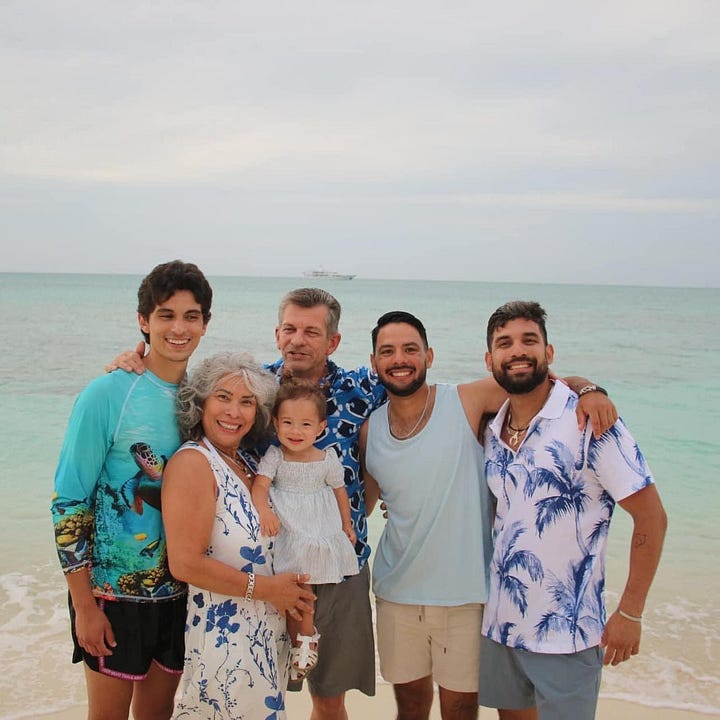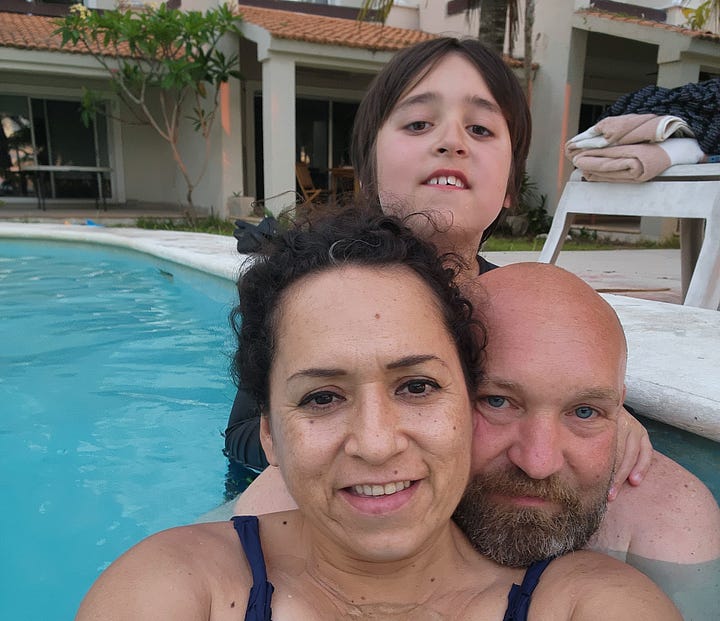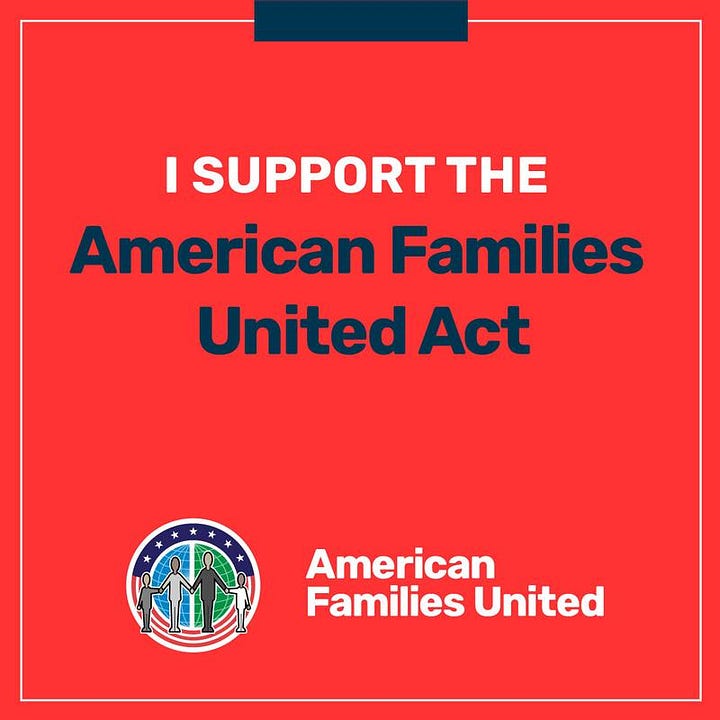Biden's Immigration Quid and Quo
The Relentlessly Rightward Shifting Overton Window Continues
This post is dedicated to Ashley DeAzevedo, president of American Families United, and the two million US citizens married to someone considered “inadmissible” to the US nation due to a tangle of 70 different exclusionary acts of US Congress or bureaucratic barriers that block their pathway to citizenship. This includes the 700,000 mothers and fathers parenting US citizen children alone or from abroad after one spouse was forced into exile – banished not for their unlawful acts, but for their unlawful presence in the US.
Even when they were in the process of trying to immigrate “the right way”…




Amanda Valencia is a Michigander.
She and her husband, Edgar, have a son and a daughter, aged five and nine, respectively. Edgar is of Mexican origin. In October 2021, they were ready to pop the champagne after a long, involved process of adjusting his status to legal permanent resident — the gateway to becoming naturalized as a US citizen. The family had just one more hoop to jump through. Edgar was instructed to cross the line south into Ciudad Juarez for his final interview. Their lawyer assured them that all would be fine, that it was a routine last step.
It wasn’t. Once in Mexico, the US Embassy banned Edgar from returning to his family for ten years. Edgar was banished not for unlawful acts, but for his unlawful presence in the US.
He subsequently suffered a life-threatening brain hemorrhage. He needed emergency surgery. Amanda had to use up all her vacation time from work to be by his side — and at great personal expense. Throughout the ordeal, she had to leave their children behind.
When Edgar and Amanda’s young son asks, “Mommy, why do all other families have dads and I don’t,” their daughter consoles him, saying:
“We do have a dad, remember. He just can’t come home.”
Ed Markowitz hails from Colorado and is a veteran of the US Navy.
He is now living in exile in Canada, however, to keep his family together.
His wife of 22 years had a 10-year re-entry ban applied to her name in 2000 before they met. It happened upon returning from a trip to Acapulco with her then six-year-old son, the youngest of two boys from her first marriage. US federal agents separated mother and son. Distraught and desperate, Rocio agreed to “voluntary departure” to be reunited with her boy as swiftly as possible. To make their family whole again, she had no other choice but to return to the US “without inspection,” aka between ports of entry, undetected.
Ed and Rocio met shortly after that. He knew she was without status when they married. But Ed believed that as a US citizen, he would have no trouble getting her a green card. He wanted to do it right. They started the paperwork a month after they were married, seeking the counsel of immigration advocates at Catholic Charities.
When their advisor learned of Rocio’s earlier run-in with border rules and regulations, she told them: “In the legal communities, we refer to the inadmissibility bar,” which was written into US law in 1996 under Clinton, “as the family breaker.”
From that point on, Ed, Rocio, and the boys lived in the shadows. They could not be honest about their family’s situation. They could not travel abroad while still in the process of obtaining legal residence status. At long last, it was time for Rocio to return to Mexico for her final interview. Like Edgar, she and Ed had been told it was a routine part of the journey to citizenship, that all would be well. So she took along the youngest of their now three sons. As with Edgar, things did not go as planned.
A permanent ban was slapped on Rocio’s name and she was stuck south of the line. She was informed she would only be allowed to ask to reapply after spending 10 years outside of the US. Even then, there would be no guarantee that “permission to reapply” for entry would be granted. If permission to reapply were to be granted, there would be no guarantee that her application for re-entry would be approved.
Mother and son remained separated from husband and father, sons and brothers for a full year while Ed searched for a solution. Facing intransigence on the part of the US government at every turn, Ed gave up on his home nation. He found a job in Canada and brought his wife and the youngest to him there.
However, the older two boys were then on their own citizenship journeys linked to the status of their biological dad. No matter which way the Markowitz family turned the prism, the reality reflected back at them was separated from one another for the foreseeable future.
Says Ed: “It was like ripping a branch off a tree and peeling the bark along with it.”
This is Family Separation 7.0, a tragedy from which even US citizens and Trump voters are not immune.
Ten thousand more Immigration and Customs Enforcement (ICE) officers were added to the people-hunting force in the initial months of his administration. They grabbed fathers at church and cuffed mothers waiting for the school bus with their kids. They raided homes, without warrants. They picked locks and knocked down doors. They sowed terror in immigrant communities on behalf of the US federal government.
The surge in ICE arrests rendered thousands of US-born children orphans overnight, inflicting lifelong psychological harm, and often propelling remaining family members into destitution. Broken families were suddenly plunged into housing and food insecurity; even the youngest expressed depression and suicidal ideation. Mothers and children fell into a decimated and underfunded welfare system, chipped away at since Gingrich’s 1994 hit job: the “contract on America.” Many were forced to move from friends and communities of caring, all because of a loved one’s incarceration and deportation.
One mother, Cecilia Rochester grew so anxious her hair fell out in thick clumps. She stopped driving altogether and became fearful of taking her son, Ashton, to school in the affluent Atlanta suburb where she lived and owned a home with her Georgia-born husband, Jason.
Jason Rochester is an Atlanta-based, evangelical Christian, and UPS driver.
Jason met Cecilia while on the job, delivering packages for UPS, in 2004. It was love at first sight. “She was so pretty and funny. She had such a beautiful smile.”
He wooed her for nearly two years. Though he felt she reciprocated his love, she refused his advances. It turned out, she was afraid to tell him that she was among the eleven million US residents without status. A co-worker finally spilled the beans: “She’s undocumented,” he said.
Jason didn’t care. In his eyes, she was neither “illegal” nor an “alien.” She was the woman of his dreams. They were meant for each other.
Under Obama-Biden, ICE granted one-year, renewable work permits to many law-abiding immigrants who had been in the country for at least five years. Cecilia had one, making it possible for her to earn a living. But it also put her on ICE’s radar. And though Jason voted for Obama in 2008, hoping he would fix the immigration system and make it easier for Cecilia to pursue citizenship, by 2016 immigration was not his main concern. Overturning Roe v. Wade was. So he swung conservative. He voted for Trump.
Even when the candidate’s campaign rhetoric caused Cecilia great worry—she felt personally attacked when Trump painted all Mexicans as rapists and criminals—Jason had faith that he didn’t mean her. He believed that the candidate, as president, would not target “good” immigrants.
“Cecilia had never even gotten a traffic ticket. I never imagined she would be considered a ‘bad hombre.’”
Jason assured her that the US government wasn’t interested in them. But early in 2017, it was clear he was mistaken: “Cecilia had been lumped into the same category of felon as a drug dealer or known member of MS-13.”
With her next ICE appointment and work permit renewal coming up in November, Jason and Cecilia faced a no-win situation: “If she went, she risked being arrested and deported on the spot. If she didn’t, we all risked the possibility of ICE agents knocking down our door,” recalls Jason.
Ashton was only four years old. Cecilia would do anything to shield him from the trauma of seeing his mother being shackled and hauled away. She and Jason sought legal counsel. They were advised that if Cecilia agreed to “voluntary departure,” she could avoid a deportation order, restart the process of becoming a legal citizen from Mexico, and immigrate “the right way” under the long-standing scheme that privileges family reunification.
But Trump & Co even took “the right way” away. After Cecilia told Ashton, “Mommy will be back soon,” and returned to Mexico, her attorney shared the bad news that she was barred from coming back to her son, in perpetuity.
Even when, a year later, five-year-old Ashton was diagnosed with kidney cancer and had to undergo surgery, chemo, and radiation therapy, the Trump administration refused Cecilia the possibility of returning under humanitarian parole.
On June 18, 2024, the same day Crossing the Line launched to the public in print, e-, and audiobook formats, President Biden announced an amnesty program, called Parole in Place, for undocumented spouses of US citizen families.
This is great news for roughly 500,000 families. It is a move the should be applauded. It will protect Ashley’s husband, who is still north of the line with his family.
But what about Cecilia and Edgar, Rocio and Ed? What about these families, Joe?
The out-moded, insanely complex, and deliberately cruel US immigration system is now such a tightly wound and tangled Gordian knot it’s hard to know which string to pull first to unwind it and make it right. Maybe this will be it.
But given Biden’s earlier June 4 proclamation, which closes the valve to people arriving at the border just as Trump did, it feels like a teeny-tiny humanitarian Quid trying to balance a whole lot more “law and order” Quo — just another attempt by the Democratic party to tinker at the edges of a system politicians love to decry as “broken” but which is working just fine for the demagogues and profiteers who benefit from it.
Say it ain’t so, Joe. Say it ain’t so.




